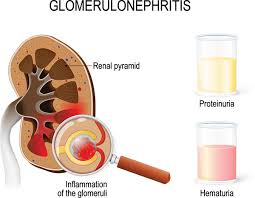03 Feb 2026
Rhinoplasty Revision Surgery in Mohali: Cost When Your First Nose Job Fails


Dr. Navjot Kaur
22 Jun 2025
Call +91 80788 80788 to request an appointment.
Glomerulonephritis (GN) is a significant kidney disorder characterized by inflammation of the glomeruli, the tiny filtering units within the kidneys. This condition can have serious implications if left untreated, as it can lead to chronic kidney disease or even kidney failure. Understanding glomerulonephritis is crucial for timely diagnosis and effective management, especially for residents of Mohali and surrounding regions who seek specialized nephrology services.
At Livasa Hospitals, located in Mohali, our nephrology specialists are equipped with advanced knowledge and technologies to diagnose and treat glomerulonephritis effectively. Early detection and medical intervention can significantly improve outcomes for patients, making awareness about this condition essential.
The causes of glomerulonephritis can be diverse, and understanding them is critical for proper treatment. The condition may result from:
The symptoms of glomerulonephritis can vary based on the underlying cause and severity of the condition. Individuals may present with:
Diagnosing glomerulonephritis typically involves a combination of medical history evaluation, physical examinations, and laboratory tests. The diagnostic process may include:
Treatment for glomerulonephritis depends on the underlying cause and severity of the condition. At Livasa Mohali, our nephrology team offers a variety of treatment options including:
| Treatment Option | Indications | Outcome |
|---|---|---|
| Medications | Corticosteroids, immunosuppressants, and antihypertensives are often prescribed to control inflammation and manage symptoms. | Reduction in inflammation and slowing the progression of kidney damage. |
| Plasmapheresis | Used in severe cases or those associated with autoimmune disorders where harmful antibodies need to be removed. | Potentially rapid improvement in kidney function. |
| Lifestyle Modifications | Dietary changes, regular exercise, and managing underlying conditions. | Improved overall health and reduced stress on the kidneys. |
Long-term management of glomerulonephritis entails regular follow-ups with a nephrologist. This is crucial for monitoring the disease progression and response to treatments. Regular blood tests and urine tests should be scheduled to:
This proactive approach helps to prevent further kidney damage and can improve long-term outcomes significantly.
A diagnosis of glomerulonephritis can be overwhelming, but understanding the condition empowers patients to manage their health effectively. Patients are encouraged to:
Glomerulonephritis is a manageable condition, especially with timely and appropriate care. The nephrology team at Livasa Hospitals in Mohali is dedicated to providing comprehensive kidney care, applying the latest medical advancements to ensure optimal patient outcomes.
If you experience symptoms indicative of kidney inflammation, don't delay in seeking help. Early intervention can be crucial in preventing complications and preserving kidney function. Contact us at +91 80788 80788 to schedule your consultation or book an appointment today.
Living with glomerulonephritis may require adjustments in lifestyle and medical management, but with the right support, individuals can lead fulfilling lives. Livasa Hospitals is here to support you at every step. Reach out to our kidney inflammation specialists in Mohali to learn more about your treatment options and strategies for maintaining kidney health.
Rhinoplasty Revision Surgery in Mohali: Cost When Your First Nose Job Fails
Plastic Surgery After Massive Weight Loss: Body Contouring Packages in Mohali
ENT + Cosmetic in Mohali: Septoplasty for Breathing with Cosmetic Rhinoplasty Offers
Livasa Healthcare Group Corporate Office,Phase-8, Industrial Area, Sector 73, Sahibzada Ajit Singh Nagar, Punjab 160071
| Mohali | +91-99888 23456 |
| Amritsar | +91-99887 49494 |
| Hoshiarpur | +91-99883 35353 |
| Nawanshahr | +91-75081 82337 |
| Khanna | +91-98888 05394 |